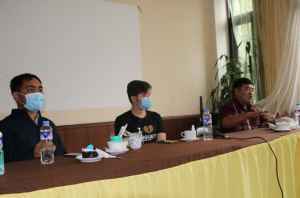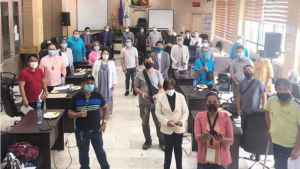DepEd, CHED: Region 1 ready to resume classes under “new normal”
VIGAN CITY, ILOCOS SUR— The chiefs of the Department of Education (DepEd) and Commission on Higher Education (CHEd) in Region 1 said they are ready to resume classes for the Academic Year 2020-2021.
In a virtual presser organized by the Philippine Information Agency Ilocos on June 3, the officials announced their readiness for class resumption.
They also assured parents that they are doing everything to ensure the safety
of the students.
“Magsisimula sa August 24 subalit nais naming bigyang diin at pawiin ang pangamba ng ating mga magulang na ang ating pagbubukas sa August 24 ay hindi po face-to-face,” said DepED Regional Director Tolentino Aquino.
However, the director admitted that face-to-face sessions are still an integral part of their teaching strategy.
“Kung sakali pong kailangan ang face-to-face ay tinityak [namin] sa ating [mga] magulang na mahigpit nating iasaialang alang ang ating mga health protocols na ipinapayo ng IATF at DOH,” he said.
Aquino added the measure would include the limiting of the number of days to report physically in the schools and 15-20 students per classroom.
According to him, they will utilize the whole month of June for the enrollment. The remaining period before the opening is for them to prepare the faculty and needed equipment and facilities.
He urged parents should take advantage of the first two weeks. Online enrollment is ongoing until June 15. Walk-in registration will commence after the period.
However, DepEd advised parents to call the school and set appointments to prevent
crowed build-up in the schools.
“Hinihiling po namin sa magulang na samantalahin po natin ang first two weeks para magkaroon tayo ng tamang bilang ng magaaral.
Ang kahalagahan ng pagenrol nila sa first two weeks ay upang mapaghandaan ang instructional materials na kakailanganin nila,” the DepEd head said.
He said their main problem at present is facilitating the enrollment of those transferring from other schools. As of 5:00 pm, June 2, DepEd Region 1 registered 100,822 enrolled students.
Aquino explained the department would utilize “blended learning” – using mainly modular instructions and supplemented by online education in areas with internet connectivity. However, he underscored that it will still depend on the capacity and availability of materials in the locality.
Meanwhile, CHEd Regional Director Rogelio Galera said they already released an advisory to guide higher education institutions (HEI) for the opening of classes.
Among those stressed in the instruction from the national office, he said, is for HEIs to prepare for the flexible learning options (FLO).
“Ang ating mga kolehiyo, dapat po ay nagkaroon na ng massive training ng ating mga faculty dahil nga po sa implementation ng flexible learning dahil ang sinasabi natin ay mixture ang delivery ng instructions ng online at offline mode,” the CHEd official said.
He explained that they identified three levels under FLO – the high, medium, and low. The categories pertain to the level of the available facility, technology, and online connectivity.
In particular, low level HEIs are those with scarce or no internet connection, cell phones, and laptops.
“Dapat magkaron na sila ng learning management systems na ipapatupad sa kanilang mga iskwelahan kung sakaling mag-implement ng online learning modalities,” he added.
According to him, based on the survey conducted just after the announcement of the
enhanced community quarantine, around 54% of HEIs in the region are in the low-level FLO category.
He said another survey is necessary to determine the development since DepEd instructed the schools to prepare for class resumption.
Galera said that resumption of classes for tertiary schools would depend on their readiness for the delivery mode they identified.
“Kapag sila ay full online anytime after May 31, pero if FLO open anytime in August. Kung significant ay face-to-face they should open not earlier than September 1 batay sa CHEd Advisory No. 7,” he added.
However, both officials admitted that there are still significant challenges that they need to hurdle.
Aquino said DepEd’s primary concern is how to bring and collect the modules from the students. In addition, he pointed out that internet connectivity remains an issue in many parts of the region and schools.
According to him, they have an initial agreement with local governments that the barangays will facilitate the delivery and collection of the materials.
“Nakuha na ang suport ng mga barangay. Meron ng isang depository area kung saan doon kukunin ang material at doon din ibabalik para kunin ng paaralan,” he explained.
For CHEd, Galera identified as the level of technology available as one of the critical challenges that students, faculty, and HEIs have to grapple.
“Sa students, iba pang yung pakiramdam na ikaw ay pupunta mismo [sa paaralan] kumpara sa ikaw ay nag-aaral sa bahay through your laptops and tablets. Ganun din sa faculty,” he noted.
According to him, even those ready for online learning need to review and consider many factors.
“Sa online, sapat ba ang course content na ibibigay sa mga students? Papaano ang evaluation and assessment ayun sa learning outcomes?
Ano yung mga technology na gagamitin at support services na maaring ibigay?” Galera said.
He emphasized that HEIs have to use their resources to “transform to online modalities, especially those not ready for online learning.”
Also, they need to adjust existing policies and facilities to comply with health protocols.
Sherwin De Vera/contributor
Community Billboard
INTERNATIONAL DANCE DAY
May 4, 2024
YOUNG SKATEBOARDER
May 4, 2024
REDEVELOPMENT
May 4, 2024
FROM FIELD TO FEED
May 4, 2024
BIKE FOR A CAUSE
May 4, 2024
“BIKE FOR A CAUSE” NG UB, SUPORTA SA BARANGAY
May 4, 2024






